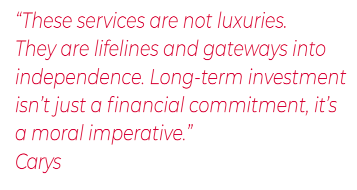Children and young people with special needs are being failed by the current system, writes Pooja Sharma.
Thousands are without a school place that meets their needs, and many are being excluded from school. To reverse these trends, our system needs to be re-designed to be more accountable, with better long-term funded, and with children and young people’s voices at the heart of it. It is vital we meaningfully incorporate children and young people with SEND in all decision-making.
There is also a pressing need for an accountable educational system and a stronger investment in the education and specialist workforce. Without these mechanisms in place, children and young people are losing vital educational opportunities, with long-term consequences for their all-round development, wellbeing, and social and emotional needs.

For the education system to effectively support disabled children and young people and children and young people with SEN, the government must create an enabling environment for all practitioners to carry out their duties as stipulated by SEN and Disabilities legislation. Tribunal should not be the only recourse for young people and their families to have their needs met, the system must place a duty for local authorities and schools and settings to prevent non-compliance with the law and encourage more inclusive practice. Key to ensuring the needs of disabled children and young people and those with SEN are met a long-term funding strategy to identify and meet needs at the earliest possible point. The current funding arrangement is not designed to do this, with the result that children and young people are not getting the support in education that they need.

Diminished funding in LAs and education institutions has led to an erosion of LA support, a loss of specialism in attendance, and a significant reduction in early preventative work. This has resulted in high costs further down the line when children and young people require statutory provision, leading to a reactive system rather than a preventative one. The recruitment and retention crisis means children and young people and education professionals do not have readily available access to specialist support, and therefore their needs are not being met throughout their educational journeys.
The voices of disabled children and young people and those with SEN, and their families, are too often dismissed, belittled, and distrusted. This leads families to navigate a system which is adversarial, disempowering and not fit for purpose, causing many to seek redress at tribunal for their voices to be listened to. Disabled children and young people and children and young people with SEN, and their families are experts by experience and they are best placed to understand which SEN exist and the provision required.
The next government must commit to ensuring that the voices of children and young people and their families are heard, incorporated into policymaking and are at the heart of all decisions in the SEN and Disabilities system.

Pooja Sharma
Dr. Pooja Sharma is Education Programme Manager at the Council for Disabled Children. Their recently-announced SEC Manifesto highlights key priorities for parliamentarians to resolve the SEN and disabilities crisis.
Website: councilfordisabledchildren.org.uk
SEC Manifesto: https://shorturl.at/cjqv4














































